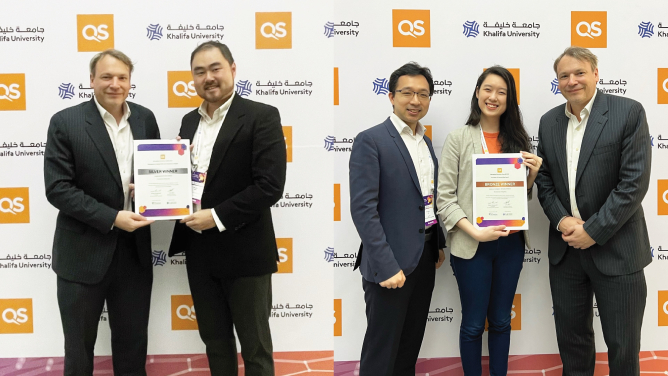Two innovative teaching and learning projects led by The University of Hong Kong (HKU) earned honours in the Quacquarelli Symonds (QS) Reimagine Education Awards, presented in Abu Dhabi in December 2023.
Often referred to as the "Oscars of Education," the awards are designed to honour the most innovative and effective approaches to enhancing student learning experiences and employability outcomes.
The 2023 QS Reimagine Education Awards received a record number of more than 1,200 submissions across 17 categories. HKU has garnered accolades in two categories: Developing Emerging Skills and Competencies and The Power of Partnerships.
Empowering Future-Ready Graduates
The project "Transdisciplinary for Future Readiness" led by the HKU Common Core team won the Silver Award in the Developing Emerging Skills and Competencies category.
The project, led by Professor Julian Tanner and Dr Jack Tsao, Director and Associate Director of HKU Common Core, addresses today's fast-paced and intricate global context, where graduates must develop specialised knowledge alongside an interdisciplinary perspective to drive innovation and excel.
HKU's multi-award-winning interdisciplinary curriculum and co-curriculum serve as the cornerstone of this project, designed to cultivate critical thinking, adaptable skills, and a comprehensive worldview — qualities imperative for navigating and excelling in an increasingly complex future.
At the heart of the curriculum are four thematic pillars: Science, Technology, and Big Data; Arts and Humanities; Global Issues; and China: Culture, State, and Society. The framework brings together teachers from faculties and diverse disciplines on courses that address contemporary issues from multiple perspectives grounded in the United Nations Sustainable Development Goals. By moving learning out of the classroom into the community through partnerships with local organisations and international universities, students gain hands-on experience and respond creatively to generate social impact.
"Winning this award provides international recognition for our curriculum, which is internationally distinctive and an effective and sustainable model for transdisciplinary education worldwide, especially in research-intensive universities. The curriculum's effectiveness is backed by over ten years of implementational experience that delivers transformative teaching and learning to students to develop a range of essential capacities for future-ready graduates," said Dr Tsao.
Student-Educator Partnership
The project "Students as Co-Designers: Formalising Student-Educator Partnership in Curriculum and Pedagogy Co-Creation" led by Dr Mei Li Khong at the Faculty of Medicine won the Bronze Award in The Power of Partnerships category. Other team members include Professor Julian Tanner, Dr Peter Lau and Dr Binbin Zheng, and six MBBS students: Winson Chan Hei Man, Justin Ng Ka Yu, Clement Ho Ka Chun, Fok Jing Chen, Monica Lee Ka Ching, Odelle Wong Kar Yiu.
As universities seek to empower students as equal partners for change, this project set in motion a move towards formalised student-educator partnership. The team invited students to co-design curriculum, paving the way to change institutional teaching and learning (T&L). They supported student-educator dialogue across different positions and perspectives; fostered collaboration between students and educators to adopt new views of T&L; and served as intermediaries of new student-educator relationships. This was done on three levels: students with educators; across health professional disciplines; and with community and field experts.
Within 2 to 3 years, the team developed over 20 T&L innovations that benefitted more than 2,000 learners per year. The project engaged over 100 student co-designers, over 50 educators, and 12 units of field experts and community partners.
"This award internationally recognises how our initiative is significantly changing institutional T&L culture. It formally integrated student-educator partnerships into the curriculum and led to student-centred improvements while maintaining professional standards. For students, learning became more fit-for-practice. Student co-designers shifted from passive to active learners. Educators adopted new views of T&L. How we engage students in learning is changing", said Dr Khong.







